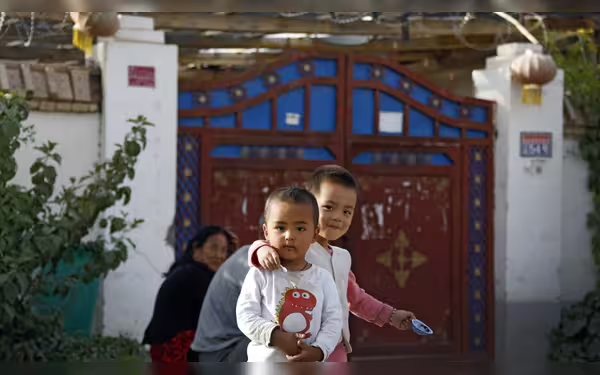Sunday, June 30, 2024 07:01 PM
Chinese Authorities Renaming Villages to Erase Cultural Identity
- Over 600 Xinjiang villages renamed to align with Communist ideology
- Renaming efforts part of broader campaign to erase minority cultural identity
- Criticism from linguists and rights advocates for erasing historical memory
 Image Credits: arabnewspk
Image Credits: arabnewspkChinese authorities in Xinjiang are systematically renaming villages to erase Uyghur and other ethnic minorities' cultural identities. This practice, along with mass detentions, has sparked international human rights concerns.
Authorities in the western Xinjiang region of China have been systematically altering the names of villages inhabited by Uyghurs and other ethnic minorities to align with the Communist Party's ideology. This effort is part of a broader campaign to erase the cultural identity of these minority groups. According to a recent report by Human Rights Watch, around 630 villages in Xinjiang have had their names changed to remove references to Islam or Uyghur culture and history.
The report, conducted in collaboration with Uyghur Hjelp, analyzed the names of 25,000 Xinjiang villages listed by the National Bureau of Statistics of China from 2009 to 2023. Terms like 'dutar' and 'mazar' have been replaced with generic phrases like 'happiness,' 'unity,' and 'harmony,' reflecting the Communist Party's influence.
Since 2017, the Chinese government has implemented a campaign of assimilation in Xinjiang, detaining over 1 million Uyghurs and other minorities in extralegal internment camps. These camps, labeled as 'vocational training centers,' aim to combat separatism and religious extremism, as claimed by the government.
The U.N. Human Rights Office has expressed concerns about rights violations in Xinjiang, including allegations of crimes against humanity. The renaming of villages in Xinjiang has also involved erasing references to religion, Uyghur history, and pre-1949 regional leaders.
These changes, peaking between 2017 and 2019 during a government crackdown in Xinjiang, are viewed as part of a broader strategy to eliminate the cultural and religious heritage of the Uyghur people. Linguists and human rights advocates criticize these actions as attempts to erase historical memory and identity.
The renaming of villages in Xinjiang reflects a systematic effort by Chinese authorities to erase the cultural identity of Uyghurs and other ethnic minorities. This practice, along with the detention of millions in internment camps, has raised international concerns about human rights violations in the region. It is essential to recognize and preserve the diverse cultural heritage of all communities, promoting understanding and respect among different ethnic groups.













